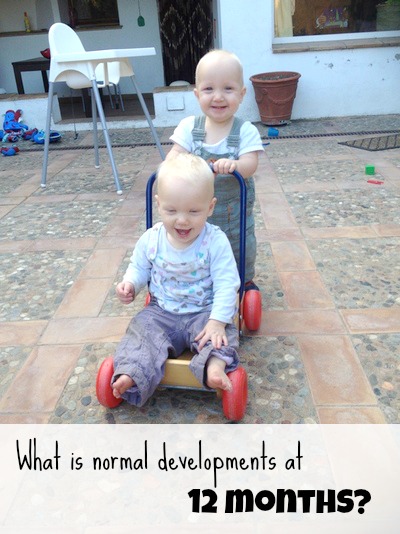
Children are amazing in their capacity to grow and learn. In the first year of your life you double or treble your weight and many children learn to talk, walk, feed themselves and various other things. That's quite a busy year.
But children grow and develop in different ways. Some children walk really early (the earliest I've personally seen is 9 months) and others are just getting there way past their first birthday. So how do you tell if your child is just a bit slow at doing something or if they actually have a problem ?
Healthcare professional divide development into 4 different areas that they look at.
Fine motor skills and vision at 12 months
That's what you can do with your hands (and being able to see). To begin with babies develop a 'pincer grip' when they learn to pick up small objects such as raisins. As they get older they can do more complicated things like feed themselves with fingers, then use a spoon. And when you're really big you can do complicated things like zips and play with lego.
At 12 months, my twins can pick things up with a pincer grip and put it in a pot and take it out again, and put it back in again. They are starting to play with wooden games, like putting rings on pegs. We tried a simple wooden puzzle the other day, they took the pieces out and then Sebastian put one back in the right place (the wrong way up). He's a genius I thought until I realised he was putting all the pieces in the same hole!
They like to clap and do movements to songs such as 'the wheels on the bus'. They can point with an index finger (funny how the first thing babies learn is to communicate what they want.) They are also adept at removing their shoes and socks.
Gross motor skills at 12 months
This is how you use your arms and legs. To begin with it's just kicking and waving your arms about. Then you learn to roll over, sit up, crawl, stand up, 'cruise' about the furniture and finally walk unaided (some children skip the crawling bit and go straight for walking). And really big children can do things like climb stairs, ride tricycles and bicycles.
At 12 months, my twins are keen to walk, but not quite there yet. They can stand and balance and take a step or two unaided but mostly it's zipping around on all fours. They can also crawl up and down the stairs (not that they're allowed to very often as we have a tiled floor.) Adept at throwing things, mostly food that they are incensed by.

Social skills at 12 months
This is how you interact with people around you. At roughly 6 weeks old, babies begin to smile. Laughing, playing 'peekaboo', waving goodbye are all examples of social skills.
At 12 months the twins can feed themselves with their fingers and are keen to use a spoon (although this invariably ends up with them waving the spoon around and food flying everywhere.) They can drink with a cup and they can turn the cup upside down and empty its contents all over themselves. They wave bye-bye and blow kisses. And they are scared of strangers which can be a bit embarrassing as everyone in town wants to stop us to say hello.
They also know which toys they want to play with and are starting to fight about them.
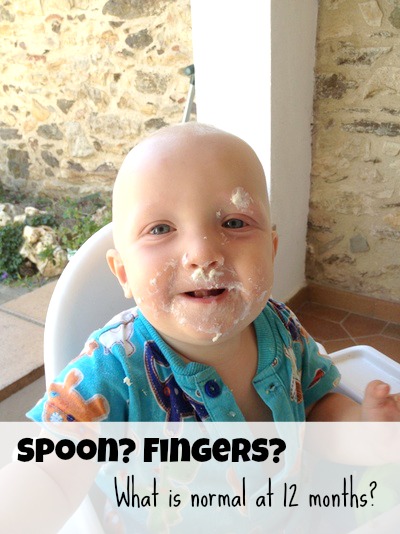
Language and Hearing at 12 months
Newborn babies can hear just the same as adults. (In the UK they test your hearing at birth.) To begin with they express themselves by crying. Then they start making sounds that don't mean much. At 10 months Sebastian would go around saying 'bb bb bb' all the time. We joked that he was really clever and trying to say 'ball' or 'bear'. Then babies start saying simple things such as 'mama' and 'dada'. Gradually their vocabulary grows until they can say short sentences and then longer ones.
At 12 months the twins are beginning to understand when I say 'no'. They hang their heads in a sorrowful way and give me a cuddle. Celeste can say 'mama' and 'dada' and they both understand who is who in the family.
What are developmental 'age limits'?
Children are all really different. Some speak really well at the age of 2 and others hardly say a word. That's fine as long as they get there in the end. There are things called 'age limits' by which time your child is expected to be able to do a certain thing. For example, the average time of walking is 13 months, but if your child can't walk by 18 months (the age limit) they should go and see a health professional. By 18 months I would also expect them to say single words with meaning (although many children will have more advanced verbal skills.)
Lastly, if your child starts to go backwards and loose skills that they previously had, you should definitely take them to the doctor.
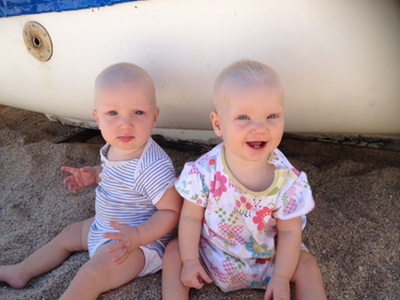
I'd love you to keep in touch, how about signing up to my newsletter?
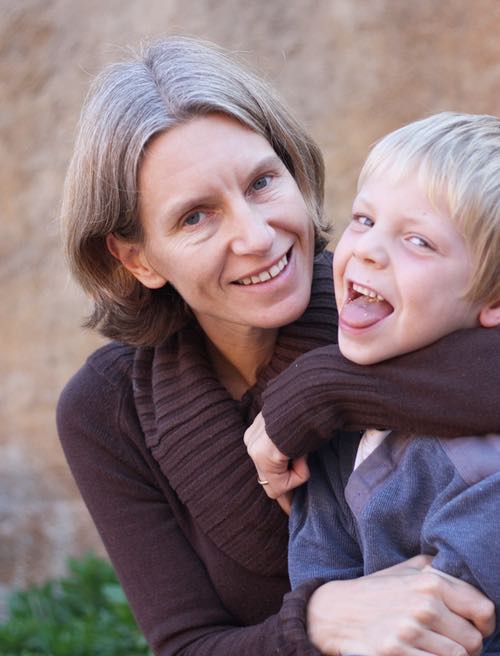
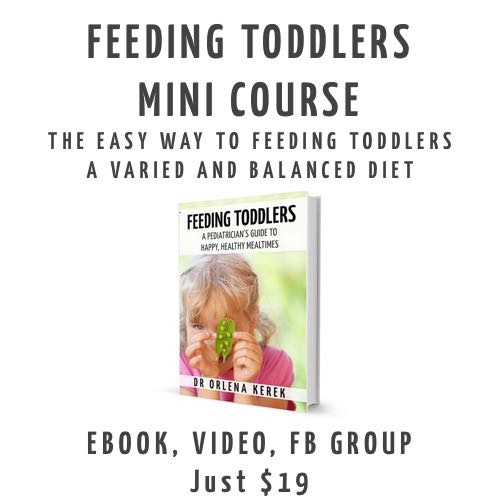 Feeding Toddlers.
Feeding Toddlers. Would you like your kids to eat more healthily? Check out the book!
Would you like your kids to eat more healthily? Check out the book!